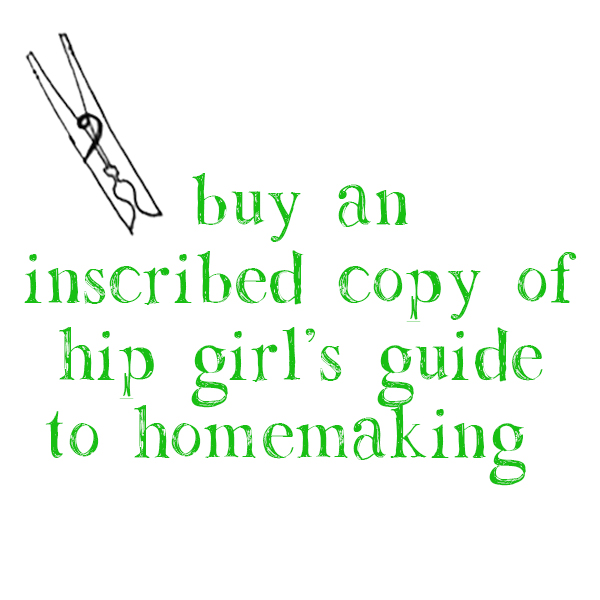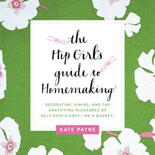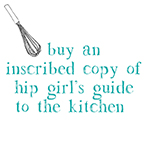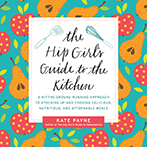Poor Girl Gourmet book giveaway
Good food is something that is so important to me and my family. I’m not just talking about flavor, but that comes as part of the package when we make our consumer choices based on how the animals, vegetables and grains we buy were treated, processed and shipped to us.
Some of you might know about my food stamps story, which I tell at length in my book (out in April). We moved to NYC and became acutely aware of our budget, $201 per month to be exact. While we worked long hours as a grad student and both of us freelance artists getting our careers off the ground, we needed help. We received food stamps from NYC for one year while J was in school. With this money we were able to eat all our meals at home (all three, really) and buy the majority of our food from local/sustainable sources all within the constraints of that $201, sometimes going over by $20-30; $230 for a month’s worth of food is still not breaking the bank for many under-employed people. Meat, of course, became a luxury item since we didn’t want to buy poor-quality, low-cost meats. We sourced our groceries from our food coop, from farmers markets around NYC (many of which accept EBT/food stamps), from pick-your-own farms and even one or two side dishes during the growing seasons from our own back-deck, bucket garden.
There’s still a huge stigma surrounding what food stamps recipients should spend money on, and unfortunately the roots stem deep into socio-economic factors and the still-very-prevalent stereotypes and rhetoric of welfare. As a former EBT recipient who was harassed in my food coop (of all places) for paying with EBT and owning an iPhone, I know it can be difficult. But as a self-employed person who still can’t afford health insurance, I’d rather spend an extra $1 at the grocery store on chicken raised without antibiotics than take my chances on food that’s not truly proven safe from a long-term health perspective. Medical bills are certainly not in our budget. We shouldn’t have to choose between taking care of our bodies with high-quality food and spending as little as possible on highly-processed, factory-farmed or GMO foods.
I know from experience that you don’t have to have money to eat food that’s both good for you and the planet. You have to be a wise shopper and learn to plan better in the kitchen, which is what I’ve been slowly learning over the past few years.
Now, off my soapbox, I’m so happy to share with you another great resource for beginning kitchen’eers, people who are just embarking on this journey or those of us who are getting the hang of it slowly. Cookbooks are a dime a dozen these days, but Amy’s book really stands out to me as one you should have on your shelf.
Poor Girl Gourmet covers the practical considerations behind eating like a king or queen at home. She adds it all up, highlighting money (or lack thereof) and getting high-quality groceries on a tight budget. The seven recipes (out of 83) that are more than $15 (and that all serve four or more people!) still don’t exceed $30. Where can you go out for a gourmet meal with three of your friends and spend less than $30?
One of my favorite things about this book beyond the price calculator and tips for getting the most bang for your buck at the grocery store is Amy’s coverage of wine and grape varietals. Up until now, I’ve happily proclaimed to know nearly nothing about wine, seeing as J is our resident wine expert. In this section Amy covers some of the great (low-cost) bottles that appear in our house regularly. I already feel more confident and empowered in the wine aisle when J isn’t by my side doing the choosing. [Next weekend I’m blogging at an Austin event called the Wine Ride, stay tuned for a breakdown of things I learn about wine pairings!]
And yes, guys, this is another book with girl in the title but is in no way for girls only. Amy shares her knowledge and love of the kitchen to anyone looking to eat better from their own kitchen.
 Enter to win this book, courtesy of Andrews McMeel Publishing, by leaving a comment on this post telling me a trick you use to keep grocery costs low, without skimping on quality. Any trick, no matter how big or small the savings.
Enter to win this book, courtesy of Andrews McMeel Publishing, by leaving a comment on this post telling me a trick you use to keep grocery costs low, without skimping on quality. Any trick, no matter how big or small the savings.
Enter by midnight on Thursday, Jan 27. Random.org will help me select a winner, who will be contacted on Friday, Jan 28. Entrants are welcomed from anywhere in the world, hooray for Andrews McMeel!
And don’t forget to leave an email address you actually check in the designated box on the comment form. Other readers won t be able to see it, just me, the person who will be emailing to tell you you won. If I don’t hear back from you by 5pm EST on the 28th, a new winner will be selected.
Good luck and happy eating!
 Kate
Kate
I got a comment this morning that was not really an entry for the book giveaway and in the interest keeping that thread going so the random number generator works as randomly as possible, I’ve removed it and placed it here.
“I’m stuck on the iPhone thing and food stamps… How did you pay the $100+ bill each month?”
I’m sure that other people have thought the same but haven’t said anything (not including the cashier guy at my co-op who decided I should be in abject poverty and give up the phone that I purchased years prior when I had a full-time job with benefits in order to fulfill his expectations of food assistance recipient). It’s important to me to address this because the whole reason I wanted to share my experience is to prevent judgement of people you see using food stamps.
Well, I’m learning that food stamps sorta belongs in the list of categories that bring up heated discussions no matter who you talk to: politics, religion, public assistance…Whatever your stance on it all, please know that until you walk a day in someone else’s shoes, you don’t really understand their situation.
While there are people out there who may have trust funds or independent means and like to pretend they’re poor or people who are just ‘milking the system’ so called, I’m not one of them.
I replied directly to the commenter this morning via email discussing with her the things that led us to, made us eligible for, and why we went off food stamps one year after starting them, which has most to do with my partner, J, finishing her one-year intensive, full-time grad program and being able to work more than 15-20 hrs/week.
I welcome constructive discussion about this topic at length via the discussions tab on the Hip Girl’s Facebook page.
 Kate
Kate
Silly me! I forgot to let you all know who won Amy’s delicious book.
After being graced with a zillion (ok, I’m an exaggerator) wonderful tips/entries by the deadline last week, let’s congratulate Amanda from Michigan. It was also her birthday on the Friday that she found out. Double fun; thanks all for such great comments.
 Budget Living,
Budget Living,  Cookbooks,
Cookbooks,  Giveaways
Giveaways 






Reader Comments (127)
I'm living with my dad right now, and he still shops like he's buying for a family of four! When I go to the store with him, I try to make sure we only buy what the two of us need. The bulk section is great for this, and sometimes I even take my measuring cups so I get exactly what a recipe calls for if it's something we don't often use. I will also halve a lot of recipes because leftovers after the second time tend to just sit in the fridge until they're ready to walk out. We've reduced a lot of wasted food and money this way.
I'd love a copy of that book! After reading Michael Pollan's work, we are really trying to eat fresh foods that aren't processed.
Like others, I buy in bulk when I am able. This is especially helpful when buying spices, as I ensure my spices are cheaper and fresher. To save in the produce aisle I buy in season when it's cheap, and I also buy slow-moving, not quite bad vegetables that have been placed on clearance. Thanks for the giveaway.
I am horrible at keeping costs down at the grocery store, so I would be very grateful to win this cookbook. My biggest cost saving is using the bulk bins - I recently paid attention to them and find that I save a lot and have less waste.
First of all thank you so much for sharing your story-You are so correct on "before you judge walk in their shoes" It's amazing how many working poor are out there. The more people that share there story on the face of hunger the more educated we will all be. As for saving-I store several bags of chicken-beef and shrimp shells in the freezer and take one Sunday and make large pots of stock. I freeze these and use them all month in soups. I also plan my meals around the grocery sales and the farmers market specials. I'm with you-beter to spend a little more for healthy food so you don't have to spend double that in medical costs. Thanks for offering up this book, looks very useful.
I try to buy meats in bulk and go to the store/market for fresh veggies at least once a week (to keep from going bad before use).
I also prepare most recipes in two separate dishes and throw one in the freezer for later use. This helps to eliminate massive amounts of leftovers that may not get eaten. I also have started a vegetable garden to help with creating sauces to be canned and used later.
I don't think I entered yet, so here goes....
I try to keep prices low by buying bulk whenever I can, reusing veggie and meat scraps for broth, saving cooking water to use as broth/smoothie liquid, and buying seasonal items at good prices. If there is a sale on something high quality, I stock up. And I keep most meals simple, using only a few ingreidents rather than every vegetable on earth. But I am also not so great at sticking to a budget, so this book will be good for me!!!!
We share a CSA with a friend so we can be sure to use every single bit of it in a timely fashion and so we can 'swap' things that each other prefers more.
I shop in bulk from the loss-leaders in the ads. After a fashion, you have enough stored to make good meals. Also, have a veggie garden and can the surplus.
I plan monthly menus so I'm never scrambling for meal ideas and as a result always buying groceries (I usually don't need). Just started making my own bread. Last week I started a sourdough starter.
I have three freezers in my basement. My hubby hunts and we grow a huge garden. I freeze most of my own vegetables and can everything else. The one thing we don't have room to grow is corn and squash so I will buy 40 or 50 lbs of squash when its on sale in the fall and then bake it and stick it in the freezer. Not only do I have squash for the year but it helps heat the house in the fall so don't need to turn on the furnace, which in Northern Wi. costs just a wee bit lol. I cannot even remember the last time I ever bought jelly or jam. It also makes yummy gifts to give at christmas time. I have alot of my own berries that I grow and I had pear trees too till the bear decided he wanted them and broke them down. ( He also got all my concord grapes this year stinker ) It always seems that my fiends enjoy the jelly as gifts at christmas or whatnot. I make my juice in the fall and freeze it and make the jelly during the winter another way to keep warm. I could go on and on but its supposed to be just a post sorry Have a good day.
Sometimes I get tired of eating the same thing all week when I cook in bulk, so my friends and I have started doing soup swaps. Everyone cooks one big pot of something and divides it amongst the people participating. The bulk cooking keeps the cost down, but having lots of people involved adds variety to your weekly meals. We swap all the recipes too. AND it's a good excuse to hang out and drink a box of wine together.
I try to use as many fresh greens in my cooking as possible. It's healthy, adds a lot to the bulk of a meal, and greens can be featured in any kind of ethnic cooking/flavors.
When I find a good deal on something I really like or use a lot of.. I try to keep in mind what can be easily frozen! I'll buy things in bulk for a really good price and put some in the freezer to use later (when those things aren't necessarily at a decent cost.) I got this from my grandmother who is in the habit of buying fresh fruit (especially berries) when they are in season and low cost and putting some of them in the freezer.
My trick with one large man child & 3 boys is shop at Aldi's & more meatless meals!
Great giveaway!!!
I try to stretch my budget until it squeaks, and it does get harder as food prices increase. With a family comprised of all me and me, we do go through some food... and since we have both vegetarians and meateaters in the house, it is hard to be creative healthy and still fit everyones needs. I just use coupons, b1g1free options, keep open to trying new foods , use substitutions whenever I can for pricier ingredients, really watch prices and brands, go with store brand whenever possible and make every meat and meat substitute last for more than one meal, yet still be different enough that no one groans, leftovers? again? It csn be done :)
I go to the grocery a couple of times a week, but I try to only buy what is on my list - fresh veggies and fruit or bread or enough chicken that we can have some for that night's supper and a day or two of leftovers. That way I don't over-buy veggies that end up going bad!
Bulk spices.... lordy the price they charge for those little jars of spices compared to what a small bag of spice to fill an empty jar is highway robbery
I buy all my grains and beans from the bulk section, make my own granola, and find a way to use a single ingredient like celery across multiple dishes so I rarely have to toss something. I also try to buy for no more than two weeks at a time and use everything up before I buy again, which forces me to be creative and keeps my costs low. :)
p.s. I think we met when our mutual friend Jeremy moved to BK, right? Nice to find your blog!
I cut my food budget almost in half by keeping a price list, using coupons, cooking from scratch, bulk buying, and meal planning.
My rice cooker helps me to keep it cheap - I can make the slow cooking polenta instead of buying it in a tube, cheap rice instead of prepared.
I used to get horribly depressed throwing store bought fresh food away. Our family of 4- 2 adults, 2 toddlers can never seem to eat produce fast enough. It's too expensive to purchase smaller servings of fresh produce (if even available) and too wasteful to toss out the leftovers of bulk purchases.
Enter a fun filled community building/ networking project! Get together a group of friends/acquaintances to purchase produce w/ you @ the store and split the veggies and fruits into servings!
It takes a bit of planning but it's cost effective and it eliminates waste.
The slow changes that we have been making in our household have been saving us money. We have been canning, and freezing garden grown veggies. When it comes to shopping, we try to use a co-op for some of our items. For other items we use coupons and price match as much as we can. What really frustrates me is that is cost more to eat healthly than it does not. And when we try to avoid many foods due to allergies it can get very expensive.
I substitue what ever fesh veggies I have on hand depending on the season for meat in a lot of dishes. I find its not only cheaper but takes less time than cooking meat. Also, if you shop someplace that has a customer card you can download electronic coupons in addition to using a paper coupon preferablly where it can be doubled and if you buy when the item is on sale, it can be a real bargin.
Spend $ on healthy convenice items at store knowing that it will keep me from spending $$$ eating out. Sure it would be even less to make it from scratch but you have to start somewhere.